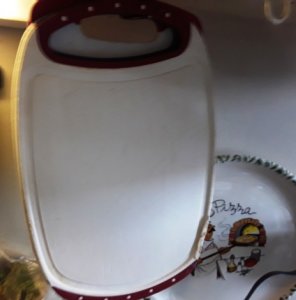Camper6
Well-known Member
- Location
- Northwestern Ontario Canada
Here's a way to get all the nicks and scratches and clean up your cutting boards as well as disinfecting them.
My own invention. It even gets out tomato and mustard stains.
And you can do two or three at once.
Use rubber gloves because you will be using bleach full strength.
On the cutting board lay down a piece of paper towel.
Sprinkle bleach full strength on it till it's covered.
Next lay another cutting board on top of that one.
And cover again with a paper towel and sprinkle bleach on it.
Let the boards sit for about a half an hour.
When you separate them they will be clean as a whistle and any scratches will be gone.
Then of course wash and rinse them thoroughly. Bleach is chlorine and in small quantities is not harmful.
I wish I had taken before and after pictures.
My own invention. It even gets out tomato and mustard stains.
And you can do two or three at once.
Use rubber gloves because you will be using bleach full strength.
On the cutting board lay down a piece of paper towel.
Sprinkle bleach full strength on it till it's covered.
Next lay another cutting board on top of that one.
And cover again with a paper towel and sprinkle bleach on it.
Let the boards sit for about a half an hour.
When you separate them they will be clean as a whistle and any scratches will be gone.
Then of course wash and rinse them thoroughly. Bleach is chlorine and in small quantities is not harmful.
I wish I had taken before and after pictures.

Last edited:

